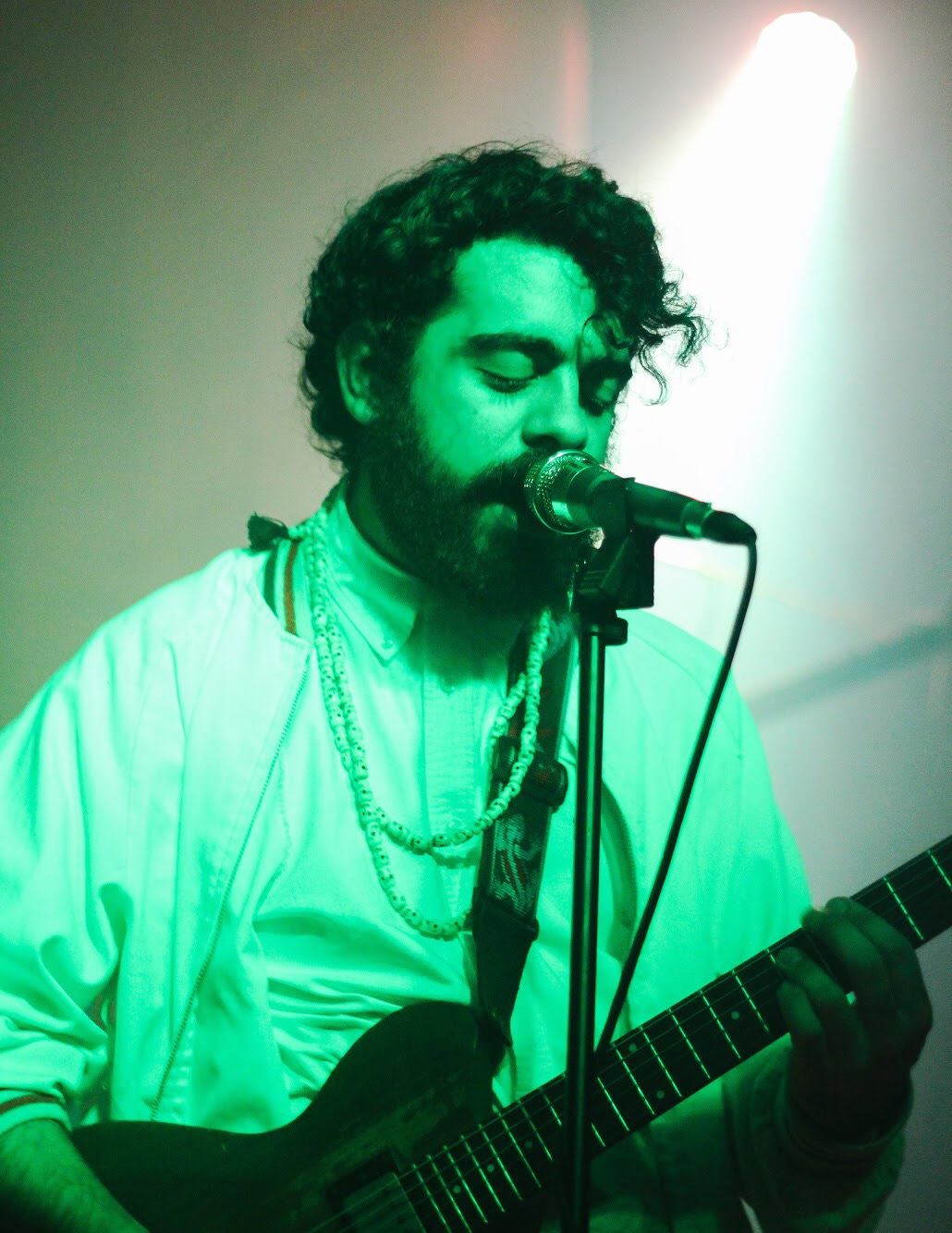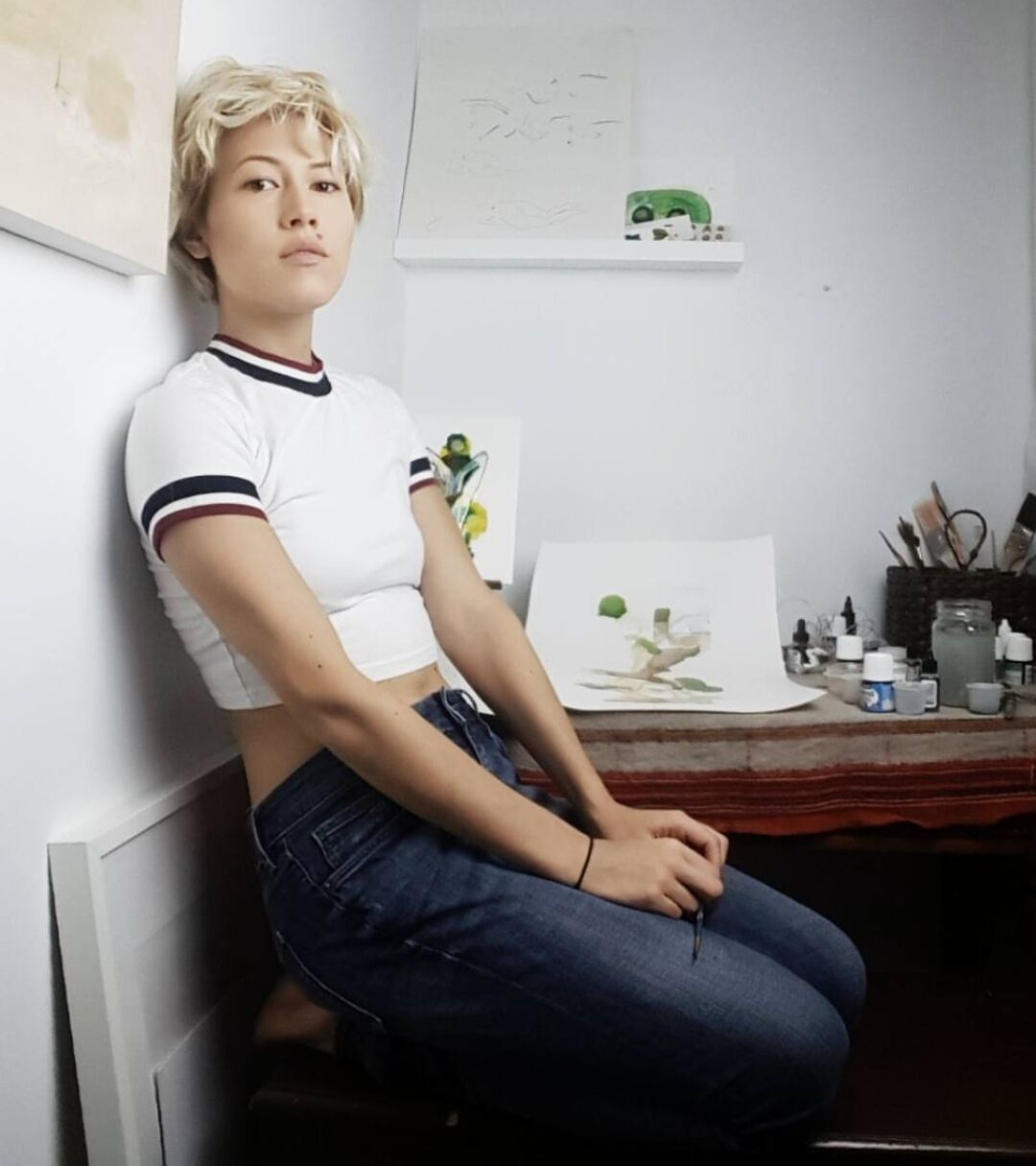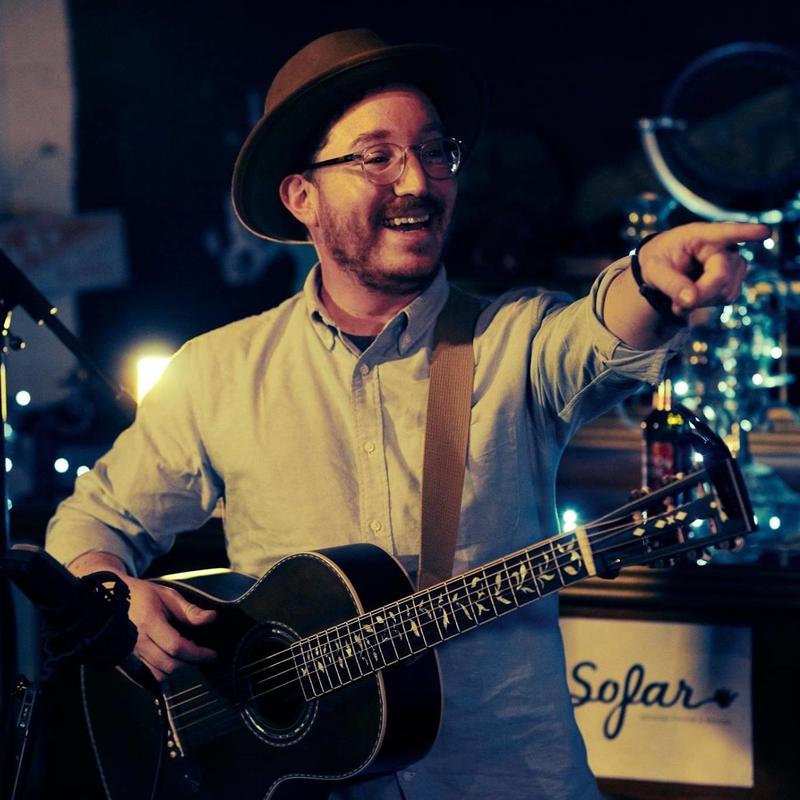|
Photo credit: Kati Balwin skeleton's music is a soothing liniment made of empathy and insight. On “Mariposa” skeleton offers a fingerpicked pop devotional that includes dreamy woolgathering reflections about commitment and the transcendental possibility of now. Pedro’s Expressionist descriptions are finessed to their most poignant elements; “everyday when you awake / the orchestra all takes its place / your brain conducts a symphony / of muscle and bone, with each line pushing the narrative. skeleton joined me for a brief chat about inspiration, songwriting, and how fortunate we are to experience love.
Pick up of a copy of skeleton was on the radio here. SC: This song shifts quickly from meditative to declarative (“love make me blind”) can you tell me about this choice? PLdV: It's always difficult for me to keep a song slow. This song is the latest example of this struggle. The sonic story still had somewhere to go, and I couldn't help but take it there. SC: I love the lyrics “Cause everyday when you awake / the orchestra all takes its place / your Brain conducts a symphony of muscle and bone”/ and you know I’m not alone / grace take make home” Can you tell me about writing them? How did you devise metaphor? PLdV: Mariposa is a song that's about being in awe of someone or something. In this case, it's about a lover whom I found to be incredibly graceful. Her movement was always deliberate and even in her stumblings she was elegant. Something as simple as saying her name would have her crane her slender neck and look at me—and these moments would always leave me alight. The mechanisms in place to produce such grace were so complicated and yet simple—sinew bone muscle etc all working in perfect concert. It's grateful, too. The overcome odds of meeting someone like that here on the infinite expanse of space/time are something to hold precious. So, it's a love song. It's an awe-song, and an "aww" song, but ultimately a love song. I love you, you're something precious and rare, and I'm so glad you've managed to flutter down to be next to me, you mad mechanism of beauty. SC: Can you tell me about writing “Mariposa”? PLdV: Writing this was easy because it was just a gut-check. Each line would ask that I check it against my feelings and it would be true. SC: How does your community of songwriters inspire you? PLdV: My community of songwriters is great and I'm pumped to have other local tunes to listen to.
1 Comment
Adelaide Tai’s latest offering “Blue” is an evocative patchwork of montages about whiskey soaked nights and missed connections. The narrative is interspersed with dynamic shifts highlighting its gossamer accompaniment. It’s a song that evokes Cat Power and Ryan Adams lovelorn anthems. “Blue” ends with a marvelous turnaround; the speaker’s eyes—which were clouded by smoke in the first verse—are now brimming with starlight as they reflect on the end of their relationship. It’s a watercolor reverie. Adelaide joined me for a brief chat about songwriting, repetition, and process.
You can download a free copy of “Blue” here. SC: I love how this is a song that moves in images—blue eyes, white shirt, etc. Can you tell me about the use of the visual in this song? AT: Blue is a scrapbook in song form. In processing an event or relationship I recall a collage of visuals. The object’s textures and colors serve as a raft in a sea of abstract feeling. The melody, I hope, strings the images together in order to create a story. SC: There’s a lot of repetition of eyes and seeing throughout “Blue”. Can you tell me a little about that? AT: When I wrote this song I was thinking about how you can have such a strong connection with a person that it feels cosmic and at the same time have an impossible time communicating with them in an earthly way. That’s what “Starlight in your eyes” refers to—a cosmic connection only accessed through the eyes and the soul, but any time you try to reach one another some other way it is a disaster. The eyes are the subject and the voice in the song. As a subject it is powerful—the focal point about which the action moves around. As the voice, it has surrendered—a witness to the experience and at the same time unable to affect change. This is the sense I had in writing the lyrics, a sense of being at the mercy of an outside force and numb to it. SC: I love the biting turn in the chorus of “you’re gonna bring me down / right where I wanted to be”. Can you tell me about this chorus? AT: If where you are is down, that’s where I want to be also—that’s the idea. It turns out in real life that’s not a recipe for success :) SC: What’s your writing process like? Do you write every day? Or wait for inspiration? AT: I usually write while I’m practicing. Inspiration finds me usually when I already have the tools handy. SC: How does your community of songwriters inspire you? AT: I am most inspired by everyone’s varied process. There’s not one way to write a song and I love to see how my friends begin in a place that I wouldn’t think of—like starting with structure vs. melody, or planning the chorus before the verses. It helps me to be free. Book Club’s hand woven pop songs feature imaginative music with inventive lyricism. On “Space Between the Days” songwriter Robbie Horlick offers touching meditations on the diurnal cycle, juxtaposed with musings on a relationship. Horlick’s lyrical devotional is complemented with banjo plucks and intermittent train beats that evokes a charmed morning budding with a sense of the immediate and the possible.
Pick up a copy of Dust of Morning here. SC: There’s repeated images of morning, dreams, awake, peace throughout the song—can you tell me about this choice? RH: I wish I could say something eloquent here. I mean, I could, but it'd be a little bit of Monday-morning quarterbacking. I'm not sure I had all of those words and themes in mind when I started writing the song. Honestly, the lyrics to this song were written very quickly, and the only thing I knew when I started writing was that I wanted it to convey the heaviness or ambiguity of what can seem so mundane if we don't look too closely at it. SC: The title “Space Between the Days” suggests night—yet the songs scenes are in the morning—can you tell me about this choice? RH: Space Between the Days suggests night? I actually never thought of it so literally. I see the "space" between days as something much smaller and harder to measure, more a feeling than a time. So I guess I never noticed that it was set in the mornings and suggestive of night. I appreciate that perspective though. Who knows? Maybe my subconscious was thinking that all along. SC: Can you tell me a bit about the dynamic shift between the verses and the chorus? Do these relate to the reflective themes in the song? RH: Definitely. I wrote all the words at one time, and set it to music a little bit later, but I remember thinking how naturally the chorus chords and words seemed to fit together. I think reflective is a good word for the verses, and I actually think the chorus is a bit reflective . . . of that reflectiveness. If that makes sense. When I say, "if the dust of morning shakes / itself off you in great escapes / it will return to say it's peace / rearranged but thick as thieves", it's like the chorus is meant to reassure the verse. Like every day is the same dust, but different, gathered up and shaken off, and there's comfort in the pattern, even if it's full of doubt or questions. SC: What’s your writing process like? Do you write every day? Do you write on a schedule? RH: I don't really have much of a writing schedule. Sometimes I enjoy getting up early, drinking coffee, and busting out the guitar and notebook – before all the distractions of social media checks and email etc. I think my thoughts are more pure when I haven't had to fight them through distractions. But that's a tough discipline. And also, there are always distractions, so I try and think of writing more as an exercise too – one I should be able to do without a magical time or place to channel that energy. Recently I've been writing words during the day, in random coffeeshop sessions, and working them into music with the guitar at night. But really, wherever I can find little patches of time to think or work on something, I will. I might write a song in 10 minutes, and another might take me 10 years. It's fun not knowing how it's all gonna go. |
The Sound Connector is an online magazine for songwriters. We feature songwriting challenges, monthly interviews, and the opportunity to discover new songwriters. We are interested in all things related to the craft of songwriting. Do you want to be featured on The Sound Connector? Send us your songs!
Categories |



 RSS Feed
RSS Feed